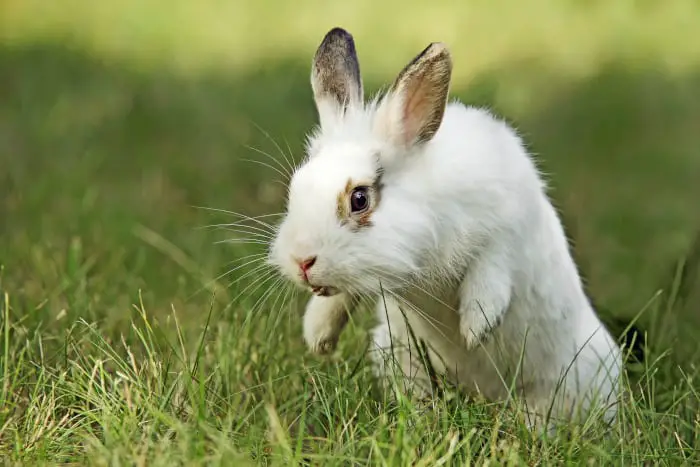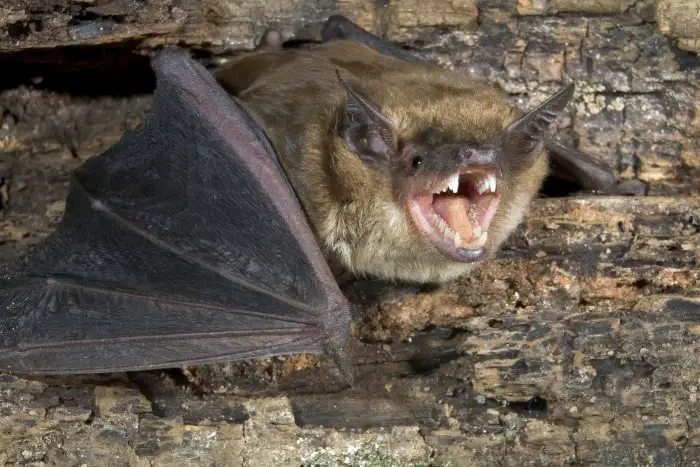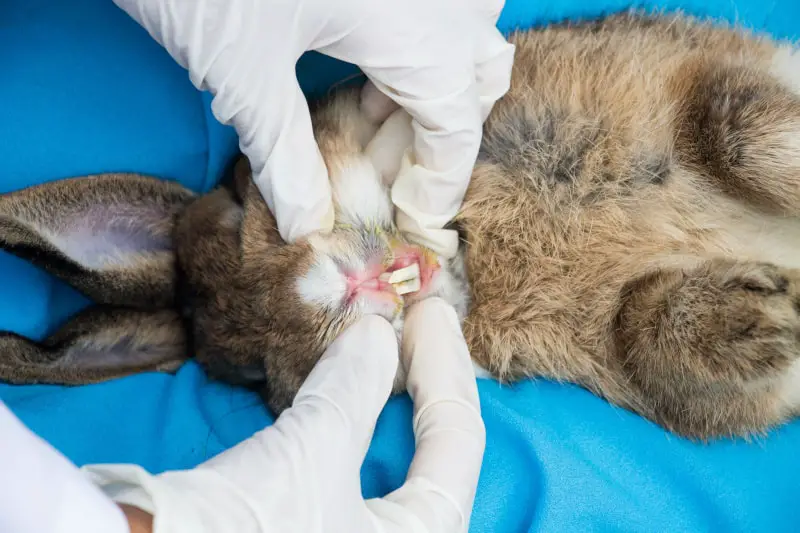Rabbits are very docile and peaceful animals, and the first thing they inspire when you see them is a pleasant feeling of sweetness. We would never imagine an adorable and furry rabbit launching a terrible bite at us, but sometimes this can happen.
Biting is an undesirable behavior in a pet, especially when it goes to the extreme of causing harm. It is crucial to correct this behavior before the relationship between the rabbit and its owner, deteriorates. But why do rabbits bite?
If you are interested in this subject, we invite you to continue reading. Next, we will introduce you to the principal reasons why a rabbit can bite and what you can do to rectify this behavior.
The Nature of Rabbits
It is not common for a rabbit to bite. Generally, these animals are very docile and gentle, even more so if they live in an environment where they are happy and healthy. However, some rabbits can manage to take a bite on certain occasions despite being well cared for by owners. It is handy to understand the nature of these animals if we want to correct this behavior.
- It is in their DNA: Rabbits in nature are animals that serve as prey in the food chains. Their survival instinct has always taught them to remain alert, and for this reason, they react quickly and abruptly to any stimulus they perceive as threatening. Despite their domestic character, rabbits at home still retain part of this instinct, so they may bite if they feel threatened, stressed, or vulnerable to what they understand to be a dangerous situation.

- They live in social groups: Rabbits in the wild tend to live in social groups. Animals that show this lifestyle tend to establish social hierarchies, so they adopt aggressive behaviors like biting to establish dominance over other group members. They may try to establish dominion over animals of the same species, different species, and even their owners.
- Rabbits are very territorial animals: This behavior is more common in females, especially when they have babies. They will try to defend their territory and their offspring by any means necessary.
- A personality of their own: Like all living beings, each rabbit has its nature; there are some which are more docile while others are more dominant and aggressive. There are even certain breeds of rabbits that can be calmer than others.
Now that we understand what rabbits are like by nature let us get down to business.
Why Do Rabbits Bite?
There are several reasons why a rabbit can bite but do not worry because you can change this behavior. These are some of the most common causes that lead rabbits to bite:
- Fear: This is one reason, if not the leading reason, why your rabbit will try to bite you. Biting is its principal defense mechanism against predators. Generally, this happens when the bunny has just arrived at the house and still does not trust you very much. So, if you chase them, hold them against their will or expose them to noisy and unpredictable movements, they may feel attacked. Unexpected situations can be quite traumatic for them and can lead to developing defensive behaviors. Remember that this behavior is in their genes because they are prey animals.
- Undesirable habitat: The environment includes aspects such as its cage, its food, and its entertaining area. Keeping your rabbit in an unsuitable habitat comprises elements such as remaining enclosed for a long time, not having a sufficiently spacious and comfortable space to exercise, a cage in poor hygienic conditions, poor nutrition, etc. A bad environment can cause a rabbit to feel stressed, leading to the development of a bad habit of biting. If space is minimal, the rabbit will not feel happy.
- Medical issues: Health problems can cause pain, which will make bunnies more irritable. When a previously loving rabbit suddenly begins to exhibit a pricking pattern, it is usually a sign of physical discomfort. Some of the most common discomforts can be due to poor dental health, such as abnormal tooth growth, arthritic conditions, abdominal pain, the presence of mites, or other injuries that we cannot perceive with the naked eye. For this reason, whenever you detect a sudden negative change in behavior, it is advisable to go to the vet to rule out a possible disease.

- Hormonal changes: Small rabbits are usually very affectionate, but when they reach around four months, when they reach sexual maturity, some begin to develop biting behavior. At this time, it is a good idea to consult your vet to see if it is an appropriate time to have the rabbit spayed or neutered. Upon reaching sexual maturity, many bunnies become more territorial, and their desire to protect their territory, their food, and their partner increases. Many others may be sexually frustrated, which leads to aggression. Most of the time, we can solve the issue by spaying or neutering them.
- Invasion of its territory: Another cause for which a rabbit can try to bite is when you try to clean their cage or grab their food bowl since they perceive this as if you were invading their territory. This behavior is more common among female rabbits, as females are usually very territorial.
- To get you out of their way: It can happen that sometimes your rabbit wants to move through an area, and you are standing on its path, and they may bite to get you out of their way. In these cases, they can bite and then hit you with their heads as well.
- To draw your attention: It also happens that they only want to draw your attention, and biting is their way of asking for food. In this case, you should not give them food because you will be reinforcing their behavior.
- They notice that you smell different: If you spend some time with another animal, when you return home, your rabbit can perceive these smells, get scared and come to bite out of mistrust. In this case, change your clothes immediately and wash your hands well to eliminate the odor.
- Love Bites: Bunnies do not always bite because they are angry. Sometimes rabbits can take love bites, and these are signs of affection. They can give small bites on the fingers or toes, but these are not usually painful.
How Can I Tell if my Rabbit Is Afraid or if It Is Giving Love Bites?
To distinguish love bites from biting out of fear, you need to pay attention to your rabbit’s body language. If it is a love bite, you will notice that the rabbit is relaxed, its hair does not look bristly, it can have its eyes closed, and licks usually accompany the bites. Love bites indicate that your rabbit is trying to groom and pamper you just as it would another of its species.
On the other hand, rabbits which are fearful will have their eyes wide open, their breathing turns fast, their hair turns bristly, and many can warn you with quick movements of their hind legs. In these cases, the best thing you can do is leave them alone to calm down and not force any contact.
The Importance of Trust
Try to build a bond of trust with your rabbit. Learn to understand their body language and show respect when they are unhappy about something. Each rabbit has its personality, and not all rabbits like to be in close contact with people.
Try to build trust and overcome bad behavior by touching your rabbit gently during your interactions and never holding them against their will. A good trick is to sit on the floor and wait for them to come to you. Once they do, offer something that they like to draw their attention, like their favorite treat. Please take advantage of the situation and try to pet them gently. In this way, you will get them to relate you with something good little by little, and they will begin to trust you. Your bunny will learn to approach you whenever it wants and receive meals or caresses when doing it.
What Can You Do to Change Their Behavior?
As we mentioned, fear is the leading cause that leads a rabbit to bite. The best way to keep your rabbit from being afraid is to gain its trust. Here are some of the things you can do to achieve this:
- Speak to it in a soft and loving tone. Avoid any punishment or yelling, as this will increase the fear and destroy the trust.
- Inadequate or excessive handling can make the rabbit feel uncomfortable and end up biting its owner’s hands. If you notice that your rabbit does not feel comfortable every time you try to hold it, do not force it. Pay attention to the things which do not please your pet rabbit and never repeat the actions to which your rabbit has responded aggressively.
- Never chase them if they decide to run away and hide.
- A rabbit that lives in minimal space or spends most of their time alone will not be happy. It needs your company or the company of another animal of its species. It will also need more space where it can play, explore, and have fun. So, allow them to have a spacious and clean place to live, with access to food and clean water, as well as physical and mental distractions. If possible, offer your company for as long as possible or consider adopting another rabbit.
- If you notice that they bite when they want food, wait at least half an hour to feed them because if you do, you will be reinforcing their bad behavior. It would be best if you allowed half an hour to pass before providing food; otherwise, bunnies will end up learning that they will have to bite every time they want to eat. Bunnies should understand that through biting, they are not going to get what they want.
- If the behavior change coincides with their sexual maturity, ask your vet if it is time to get them spayed or neutered. Most likely, spaying or neutering will solve the problem.
Being patient and loving is the best way to correct our pets. If you follow these tips, you can be sure that you will create a solid bond with your rabbit quickly. Keep in mind that there can be medical conditions that promote certain unexpected behaviors in our rabbits. If you do not understand the reason for any situation, you should not hesitate to consult your veterinarian.

